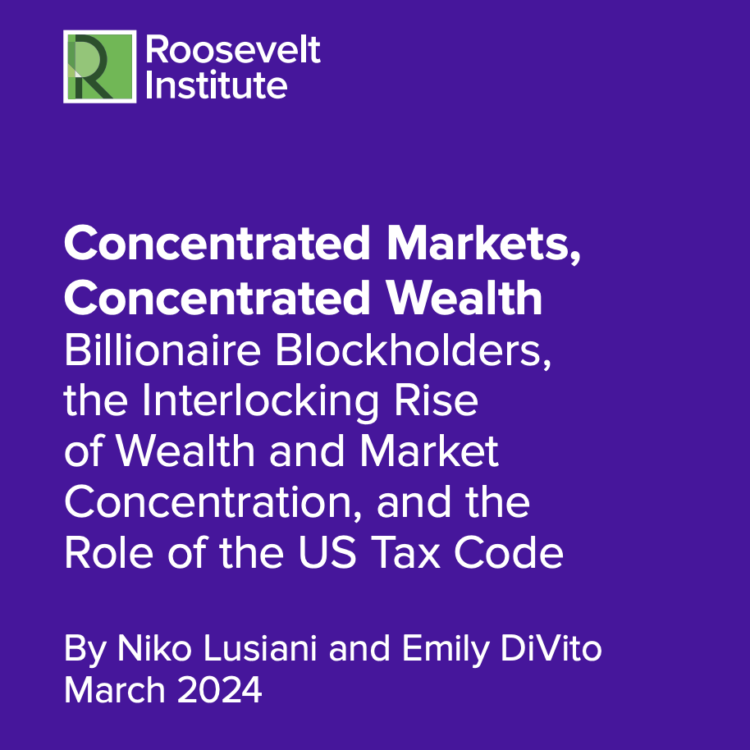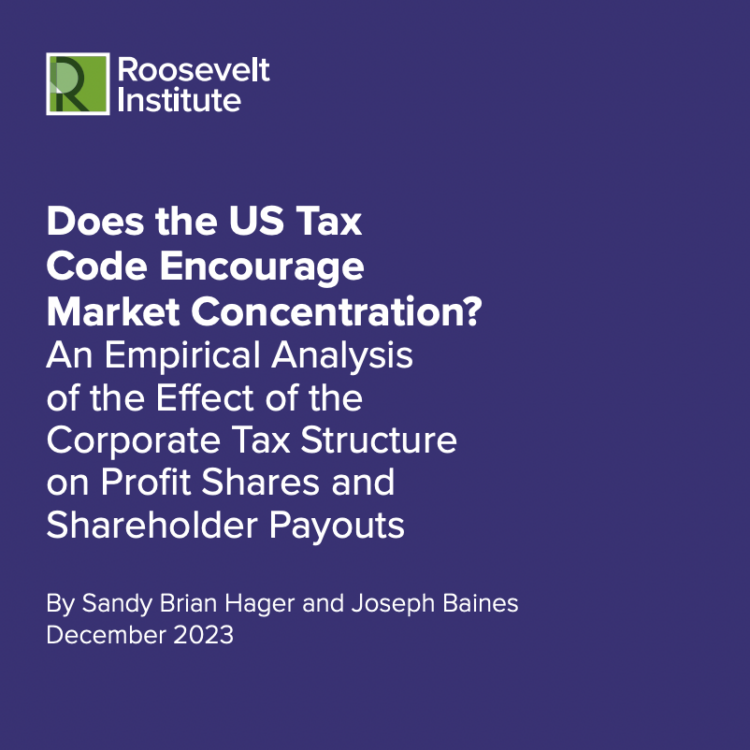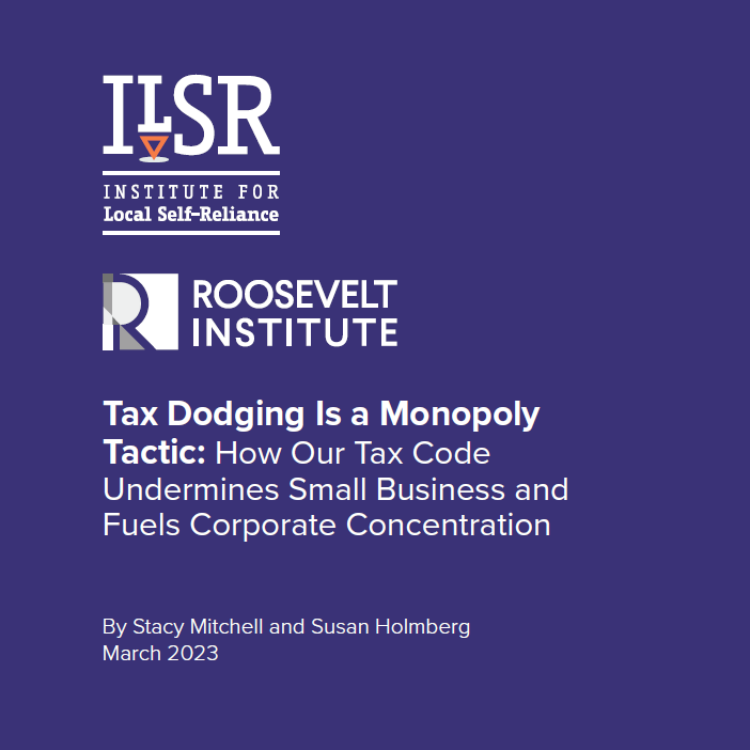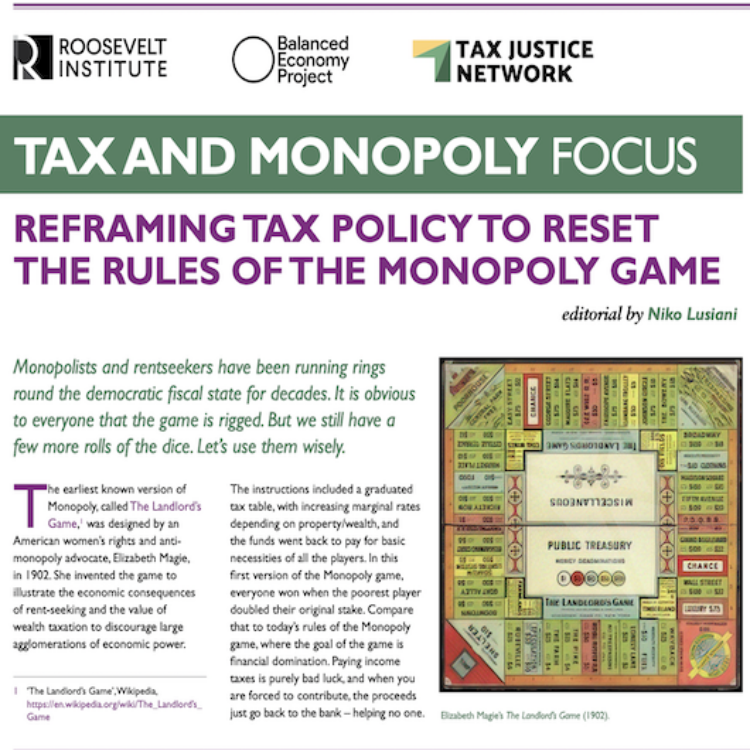Series: Taxing Monopolies
March 11, 2024
After four decades of policy choices privileging ever-larger corporate behemoths, our economy is now ruled by a small clique of supersized, dominant firms. These corporations have concentrated markets to their liking, resulting in few checks and balances that push back against these firms hiking prices, while simultaneously depressing wages and good jobs, decreasing productivity and innovation, embrittling supply chains, and exacerbating racial injustice. In turn, supersized firms exert supersized political influence—crowding out popular participation and citizen decision-making in our democracy.
For good reason, excessive market power is widely decried across the political divide. Federal and state antitrust agencies have begun to reclaim their rightful roles in checking excess market power. But antitrust agencies cannot take on this important task alone. Tax policy has historically played a complementary function in trust-busting. Yet today, taxation remains overlooked both as a driver of current levels of market concentration and as a tool to remedy the problem.
At a time of much uncertainty around the future of the US tax code, the aim of our new “Taxing Monopolies” series is to help spawn a different way of thinking about taxation. Taxation raises revenue and can help redistribute economic gains—and we certainly need more of both. But tax policy also, by nature, shapes market activity. We can continue to use taxation to double down on today’s brittle, winner-takes-all, hoarding economy. Or—as we hope this series illustrates—we can use the power to tax in a way that restructures markets to create a more innovative, equitable, and multiplayer economy.
Series Publications
In the third contribution to this series, “Concentrated Markets, Concentrated Wealth: Billionaire Blockholders, the Interlocking Rise of Wealth and Market Concentration, and the Role of the US Tax Code,” authors Niko Lusiani and Emily DiVito explore the interlocking rise of corporate concentration and wealth concentration as well as the monopoly origins and decisive power of the top 50 American billionaires over their corporations.
In the second contribution to this series, “Does the US Tax Code Encourage Market Concentration? An Empirical Analysis of the Effect of the Corporate Tax Structure on Profit Shares and Shareholder Payouts,” Sandy Brian Hager and Joseph Baines provide fresh empirical analysis to understand the effect of the US tax code on market concentration. A vivid picture emerges from their data, which tells us a lot about how one-sided our economy has become.
In the first contribution to this series, “Tax Dodging is a Monopoly Tactic: How Our Tax Code Undermines Small Business and Fuels Corporate Concentration,” Stacy Mitchell and Susan Holmberg from the Institute for Local Self-Reliance chronicle Amazon’s tax break-financed rise to retail dominance. Their brief provides a vivid illustration of how a broken tax system has helped spawn a 21st century monopoly—putting small business competitors who pay their fair share of the tax bill at a structural disadvantage. Mitchell and Holmberg show how making our tax system fairer would help small businesses—which are essential for vibrant economies, community resilience, and a healthy democracy—compete on a more level playing field.
In a ProMarket piece, “Today’s Tax Code Empowers Monopolistic Corporations. It Has Been and Can Be Different,” Susan Holmberg from the Institute for Local Self-Reliance and Niko Lusiani of the Roosevelt Institute write that the United States should tax profitable corporations not just to raise revenue and redistribute unequal gains but also to re-dynamize the economy by curbing the excess market power of rent-seeking corporate oligopolies.
“Tax and Monopoly Focus”—a joint essay collection published by the Balanced Economy Project, the Tax Justice Network, and the Roosevelt Institute, outlines how today’s tax policies have exacerbated the power of dominant, incumbent corporations. As Roosevelt’s Niko Lusiani writes in his introduction to the collection, drawing on history can help us rethink the tax code as a powerful lever to curb the excessive economic and market power of large corporations and their owners.
On April 18, 2024, the Roosevelt Institute hosted a virtual roundtable discussion with a multidisciplinary circle of authors who presented their latest research on how the US tax code affects market concentration and how to reform the tax code.
Related Resources
A Pro-Competition Economic Agenda: How Government Can Build on Recent Progress
Read the Brief by Bharat Ramamurti Opens in new windowCorporate Profits and Monopoly Power: The Critical Role of Tax Policy
Read the Testimony by Roosevelt's Niko Lusiani Opens in new windowModernizing the IRS Presents an Opportunity To Level the Economic Playing Field
Read the Op-ed by Roosevelt's Niko Lusiani Opens in new windowUS Taxpayers Should Not Be Subsidizing Harmful Big Oil Mergers
Read the Op-ed by Roosevelt's Niko Lusiani Opens in new window



